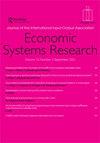最不发达国家毕业的市场准入成本:来自新兴孟加拉国的证据
IF 1.6
4区 经济学
Q2 ECONOMICS
引用次数: 0
摘要
对许多新兴经济体来说,从最不发达国家地位转移到发展中国家是一个关键的政策选择,因为它们将失去在最发达市场的优惠市场准入。孟加拉国是一个新兴贸易国的重要案例研究,该国将在2026年前从最不发达国家地位转变为发展中国家。在此背景下,我们使用可计算的一般均衡建模框架,实证估计了最不发达国家毕业对市场准入的成本。调查结果表明,如果发达国家在从孟加拉国进口时实施标准的普遍优惠制关税,同时如果孟加拉国取消出口补贴,孟加拉国的实际国内生产总值可能下降约0.38%,出口可能下降约6%。成衣行业可能受到严重影响,出口可能下降约14%。分析表明,城市家庭收入可能减少3%,家庭消费可能减少约4%。为了最大限度地减少这种不利影响,孟加拉国应确保其在普惠制+下进入欧盟市场,或与欧盟和其他主要贸易伙伴签署优惠或自由贸易协定。孟加拉国需要在世贸组织中发挥积极作用,以确保其毕业后的市场准入。简化补贴政策、提高国内生产力、竞争力和出口多样化也是最不发达国家顺利毕业的关键。本文章由计算机程序翻译,如有差异,请以英文原文为准。
Costs of LDC graduation on market access: evidence from emerging Bangladesh
Graduation from the least developed country (LDC) status to a developing country is a critical policy choice for many emerging economies as they will lose preferential market access in the most developed markets. Bangladesh is an important case study of an emerging trading nation that will graduate from the LDC status to a developing country by 2026. Against this background, we empirically estimate the costs of LDC graduation on market access using a computable general equilibrium modelling framework. The findings show that if developed countries impose a standard generalized system of preferences (GSP) tariff while importing from Bangladesh and at the same time if Bangladesh eliminates its export subsidies, Bangladesh’s real gross domestic product (GDP) may drop by about 0.38 per cent and exports could fall by about six percent. The ready-made garment sector could be affected severely, and export may decline by about 14 percent. The analysis indicates that the income of urban households could decrease by three percent, and household consumption may shrink by about four percent. To minimize this adverse impact, Bangladesh should ensure its market access either under the GSP plus to the EU market or by signing a preferential or free trade agreement with the EU and other leading trading partners. Bangladesh needs to play an active role in the WTO to ensure its market access after graduation. Streamline subsidy policy, enhanced domestic productivity, competitiveness and export diversification are also the keys for smooth LDC graduation.
求助全文
通过发布文献求助,成功后即可免费获取论文全文。
去求助
来源期刊

Economic Systems Research
ECONOMICS-
CiteScore
5.60
自引率
4.00%
发文量
17
期刊介绍:
Economic Systems Research is a double blind peer-reviewed scientific journal dedicated to the furtherance of theoretical and factual knowledge about economic systems, structures and processes, and their change through time and space, at the subnational, national and international level. The journal contains sensible, matter-of-fact tools and data for modelling, policy analysis, planning and decision making in large economic environments. It promotes understanding in economic thinking and between theoretical schools of East and West, North and South.
 求助内容:
求助内容: 应助结果提醒方式:
应助结果提醒方式:


